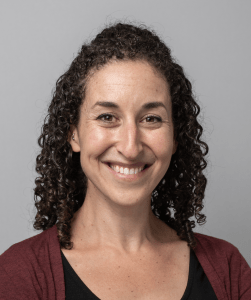“We see teenagers doing really proactive, prosocial behaviors, and so the perspective of teenagers just being reckless and crazy does not do justice to describing adolescence.”
 An interview with Eva Telzer, PhD
An interview with Eva Telzer, PhD
Associate Professor of Psychology & Neuroscience
University of North Carolina, Chapel Hill
By: Michelle Johnson (11/15/19)
Did you always want to be a scientist from when you were young?
I was born to professor parents who were biologists. From day one I was basically being socialized to be a scientist: dinner table talk was always biology; bedtime stories often included mind tricks and math problems; I was sent to “Science School” every summer. As a teenager, I decided that becoming my parents was the worst thing in the world and so rejected science altogether. I started college as an art major, wanted to be an artist, and didn’t want to do anything science-related. I went through college and never took a single traditional science class.
I enrolled in psychology classes, not knowing that it was a scientific field and thinking it was this fun field in which we get to critically think about the human mind and how we are who we are. Before I knew it, I was a psychology major and loving studying the human mind and how it develops. As part of the major requirements, I took a research methods class and a statistics class and did not understand why I had to take these more science-based methods classes to be a psychology major. It took me until the end of undergrad to realize that I was in a fully-fledged scientific field. But I loved it, and I loved doing the science!
What research topics are at the forefront of your mind right now?
 In my lab, we study adolescent development. There are a lot of behaviors that become more common in adolescence including a peak in risk-taking and other reckless behaviors like experimenting with drugs or alcohol. Statistics such as morbidity and mortality rates increasing 200-300% from childhood to adolescence, largely due to preventable causes like risk taking, got me excited about studying this developmental period. What is it that underlies this increase in risk taking, and how can we help adolescents to thrive?
In my lab, we study adolescent development. There are a lot of behaviors that become more common in adolescence including a peak in risk-taking and other reckless behaviors like experimenting with drugs or alcohol. Statistics such as morbidity and mortality rates increasing 200-300% from childhood to adolescence, largely due to preventable causes like risk taking, got me excited about studying this developmental period. What is it that underlies this increase in risk taking, and how can we help adolescents to thrive?
At the same time that risk-taking and reckless behaviors increase, adolescents is also a time of growth and opportunity. There are all of these very positive aspects of development in which [adolescents] are exploring their world, developing autonomy and perspective taking skills, gaining new relationships, and putting themselves out there for really good causes. For example, teenagers are standing up for human rights such as gun control, teenagers are standing up to fight climate change, and are ditching school to protest for good causes. We see teenagers doing really proactive, prosocial behaviors, and so the perspective of teenagers just being reckless and crazy does not do justice to describing adolescence. I really try to understand both the good and the bad of this developmental period.
Does your research ever cause you to reflect on your own experiences with adolescence?
In a way, a lot of what researchers study is “me-search,” and they get interested in something because they experienced it in their own life or saw somebody who experienced it. I often look back now at my teenage years and apply some of the things that we study to my own experiences as a teenager in both good and bad ways. There were a lot of behaviors I engaged in that were along the lines of, “What was I thinking?” But there were a lot of things that maybe I wouldn’t do now because I don’t have the passion or this developmental push to go out and explore the world and try new and exciting things. There are developmental periods when that feels more or less risky, and there are behaviors I did at one developmental period that I wouldn’t do at another.
What’s the best piece of advice you’ve ever received?
I think that there are a lot of decision points that come along, whether it is deciding what research question to ask or what to do after college or which job to take. I think following what truly makes you happy has been a point of advice that has worked really well for me. Sometimes the decision that is the most logical or prestigious is not the best in the long run. Following your heart and what you are passionate about can really help you stay in a path that you’re excited to explore.
To learn more about Dr. Telzer and her work, click here.
Click here to go back to the “Interviews with Scientists” page.
